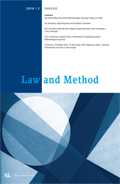|
In dit artikel geeft de auteur haar visie op het onderwijs in beroepsethiek aan rechtenstudenten. Ze bespreekt de inhoud van de juridische beroepsethiek en enkele didactische aspecten. De auteur maakt onderscheid tussen rechtvaardigende perspectieven, die een explicatie en rechtvaardiging van een onderscheidende juridische beroepsethiek en -moraal mogelijk maken, en kritische perspectieven, die een kritische beoordeling van die rechtvaardigende verhalen mogelijk maken. Ze benadrukt daarbij het belang van empirische, in het bijzonder sociaal- en moraalpsychologische benaderingen in het onderwijs van beroepsethiek. Ze wijst op het feit dat studenten niet beschikken over relevante praktijkervaring en dat dit een obstakel vormt voor diepgaande casusanalyses. In de conclusie betoogt de auteur dat de belangstelling en de ruimte voor het onderwijs in beroepsethiek aan rechtenstudenten sinds het nieuwe millennium wel is toegenomen, maar dat meer systematische reflectie op deze vakken nodig is. Ook stelt ze dat bij het onderwijs in beroepsethiek aan rechtenstudenten die nog geen werkervaring hebben in een specifieke beroepspraktijk, de nadruk zou moeten liggen op thema’s die in de beroepsopleiding minder aandacht krijgen. Het accent moet meer liggen op het verwerven van ethische en empirische theoretische kennis en kritische reflectie op rechtvaardigende verhalen, en minder op discussie over concrete gevallen. Haar laatste aanbeveling is dat in het onderwijs niet alleen normatief-ethische theorieën aan de orde moeten komen, maar ook empirische inzichten over bounded ethicality. |


Law and Method
About this journalSubscribe to the email alerts for this journal here to receive notifications when a new issue is at your disposal.
| Artikel |
|
| Keywords | professional ethics, legal ethics, research ethics, moral psychology |
| Authors | Anne Ruth Mackor |
| AbstractAuthor's information |
| Artikel |
|
| Keywords | professional ethics, ethical dilemmas, judiciary, independence |
| Authors | Alex Brenninkmeijer and Didel Bish |
| AbstractAuthor's information |
|
There is an intimate link between good conduct by judges and the rule of law. The quintessence of their role is that judges shape a trustworthy and fair legal system from case to case. Ethical trading is not carved in granite, and judges must determine their course on different levels. First, it concerns personal conduct and requires integrity and reliability. On the second level, the challenge is to achieve proper adjudication by conducting a fair trial in accordance with professional standards. Third, judges exercise discretion, in which normative considerations run the risk of becoming political. They should act independently as one of the players in the trias politica. A triptych of past cases illustrate moral dilemmas judges may encounter in their profession. Calibrating the ethical compass is not an abstract or academic exercise. A dialogue at the micro (internal), meso (deliberation in chambers) and macro levels (court in constitutional framework) could be incorporated in the legal reasoning as a didactic framework to make future judges aware of their ethical challenges. |

 Issue 12
Issue 12